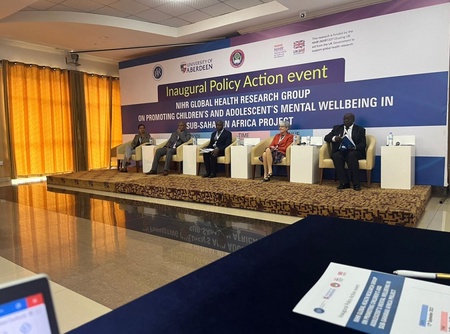International policymakers have been given their first insights into a research project spearheaded by the University of Aberdeen that seeks to improve the mental wellbeing of children and adolescents in sub-Saharan Africa.
Government officials, development agencies, local and international NGOs, University of Rwanda and education officials, along with district leaders, came together in Kigali, Rwanda today to discuss progress on a four-year study that will design and test a mindfulness programme for schools in Rwanda and Ethiopia.
The £2.9 million research project is funded by the National Institute for Health and Care Research (NIHR). Led by Professor Pamela Abbott from the University of Aberdeen’s School of Education jointly with Professor Wenceslas Nzabalirwa, Professor in the College of Education, University of Rwanda, the project is seeing research carried out in Burera and Addis Ababa.
Mental health issues are the leading cause of illness among young people aged 7-19 years, with about one in seven experiencing mental health problems.
The World Health Organisation states that by 2030 mental health issues will form the biggest burden on health care resources and recommends preventative interventions in schools. However, it remains an under-researched issue in many of the least developed countries in the world.
Delegates attending the event were welcomed by Professor Florien Nsanganwimana, Principal of the University of Rwanda, before hearing presentations on the importance of promoting children and adolescent’s mental wellbeing, developing a mindfulness intervention in schools and capacity building from researchers at both Universities.
“Regional engagement is vitally important and is built into each stage of the research, with members of both local communities including parents, teachers and young people themselves playing an integral role in developing the tailored programme,” said Professor Abbott.
“This event sought to share information about the project and the benefits effective mindfulness interventions can bring with the diverse range of stakeholders that will be crucial in delivering a locally relevant programme, while also helping the research team understand the level of interest and any potential barriers to its wider implementation.
“We were pleased with the constructive engagement from the participants at this local event which, combined with feedback from a project workshop also taking place in Kigali this week, will provide valuable input to our next steps.”


